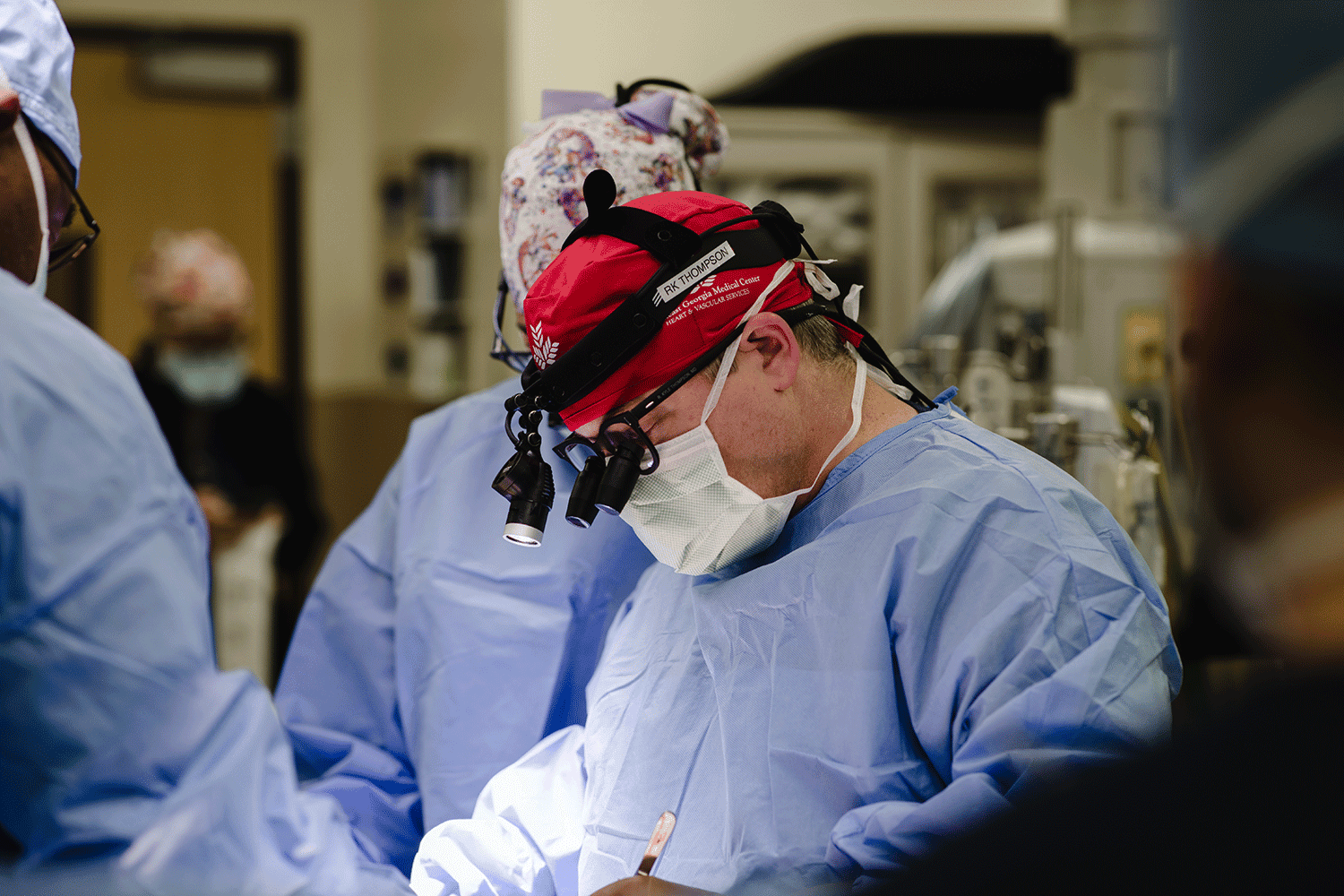If you’ve been told you need a heart bypass, you probably have many questions. That’s only natural when you’re undergoing a major medical procedure.
Many patients and their family members have questions about what recovery after a heart bypass looks like. Once the surgical procedure is over, what happens next?
Think of it this way: Undergoing a coronary artery bypass grafting procedure and recovering from a bypass procedure are two sides of a coin. Once the procedure is over, your recovery journey begins.
This journey will look a little different for every individual patient. But we’re answering a few common questions about recovery below to give you a good idea of what to expect.
What Happens Right After a Heart Bypass?
Immediately following the procedure, you’ll be moved into the Ronnie Green Heart Center, our cardiovascular intensive care unit (CVICU), where you will begin to emerge from the effects of anesthesia and your vital signs will be monitored.
In the CVICU, a team of specially trained cardiac nurses will help you through the first hours and days after your heart bypass. In the first hours in the CVICU, you’ll likely be drowsy and out of sorts.
During this time, once you’ve reestablished that you can breathe on your own, artificial ventilation will be removed and you may receive oxygen through a nasal cannula. The removal of the breathing tube may cause you to experience a sore throat or a cough.
Your vital signs will be carefully monitored, and your medical team will also be keeping an eye on your incisions and fluid output. Because blood clots are a risk when you’re immobilized in bed and following a surgical procedure, you’ll likely be given compression stockings to maintain proper blood flow in the legs.
The day after a heart bypass, you will be able to drink clear liquids, and you’ll be able to begin eating as you can tolerate it. You’ll be coached through special precautions you should take at this time, like how to change positions or cough without straining your incisions.
To help you begin to recover after the procedure, you’ll also be encouraged to perform breathing and coughing exercises to strengthen the lungs. These exercises are an important part of the recovery process.
Many patients are moved from the CVICU to a stepdown cardiac floor within a day or two.
When Will I Be Discharged from the Hospital After a Heart Bypass?
How long you remain in the hospital will depend on a number of factors, including how well you recover from anesthesia and any complications that occur. Most patients are discharged from the hospital within one week following a heart bypass.
Between the time you are moved out of the CVICU and when you are discharged from the hospital, your recovery will progress. In addition to moving from a reclining to a sitting position regularly, you will be encouraged to get up and walk for short distances. You’ll also want to continue performing the recommended breathing exercises.
When your medical team is satisfied that fluids have drained from your chest incisions, the tubes from those incisions will be removed. This will allow you to become more mobile and less restricted in your movements.
What Precautions Should I Take After a Heart Bypass?
Once you are discharged from the hospital, you will want to take special care to follow all recommendations from your medical team, including taking medications as advised. Your recovery is only beginning.
You’ll be discharged from the hospital with multiple sets of guidelines, including signs of infection to watch for in the first weeks after surgery, signs of blood clots and other potential complications, and special precautions you should take as you heal. Resources about heart-healthy living will also be provided, sharing tips on eating a healthy diet and gradually becoming more physically active.
Carefully inspect your incisions in the days and weeks after the procedure. Follow any instructions your surgeon provided about how to care for the incision, such as how to cleanse it or if it should be kept away from water.
Because your sternum was separated during the heart bypass, you will need to take special precautions to ensure your body heals properly. Be sure to follow any instructions you received for shifting your body position to avoid straining. While it may seem unnecessary, be sure to also react quickly and stabilize yourself before coughing or sneezing—even slight movements can cause pain. It will take eight weeks after the surgery for the breast bone to heal.
Even when you feel as if you can lift objects, know you probably shouldn’t. Your medical team will provide you with specific guidance about how much you can lift and when, but in general, you shouldn’t lift anything heavier than a carton of milk for many weeks after surgery. The care team will not want you lifting anything over 15 pounds within the first eight weeks after surgery.
You also shouldn’t drive in the weeks following surgery. That’s because the motions required to drive a car, such as turning a steering wheel, can be jarring to the sternum and ribs, which can delay or disrupt healing. Your surgeon will let you know when you’re able to begin driving again.
You’ll be advised to begin a walking routine after being discharged from the hospital. Cardiac rehabilitation will also be recommended, and you’ll likely begin attending sessions within a few weeks following your bypass procedure. These sessions will help you continue to recover, resume physical activity, and learn heart-healthy behaviors that will help keep your heart strong.
It usually takes eight weeks to recover following a bypass surgery, at least enough to resume normal activities. But recovery is not one-size-fits-all, and the sternum specifically may take longer to heal, which can cause discomfort and other symptoms to linger a while. Regular appointments with your surgeon and your full medical team can keep you on the road to healing.
Learn More
When you undergo a heart bypass, the care we provide doesn’t end once the procedure is complete. The cardiothoracic surgery team at Georgia Heart Institute is here to guide you through recovery, too.



